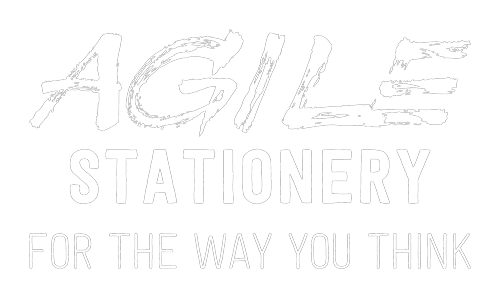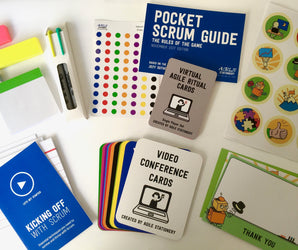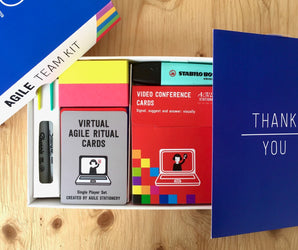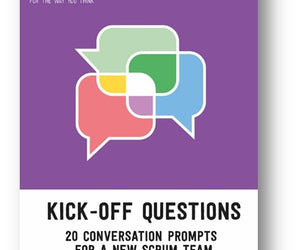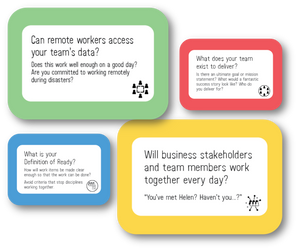Leaders are adopting Scrum in many industries because they recognise the critical importance of feedback in fast changing environments.
Teams who value Scrum the most are the teams who bravely accept their limitations. Do they really know how best to do their jobs? Perfectly? Do they really know if they are even building the right product? Recognising and confronting these uncomfortable truths is smart and Scrum is a valuable aid in overcoming the problem.
Our range of Scrum tools intend to support teams adopt and practice scrum effectively and continuously. Take a look.
1. Kick-off questions for a new scrum team
Many of the processes used to succeed with Scrum are not specified by it. Teams work within a framework but choose a great many details to suit themselves and their environment.
This deck contains 20 question cards that cover the Team, Collaboration, key Policy decisions and outside Relationships. You may find some issues cannot be resolved until later sprints, or you might have to research unfamiliar topics. Use the cards until you are confident your processes can deal with common problems and emergencies. Agree the kinds of emergencies you are committed to working through with your key stakeholders.
2. Scrum Poker
Teams adopt practices such as having a Definition of Ready and fixed length Sprints to improve their productivity and also ensure their delivery is predictable and regular. Stories and features that are too complex overrun and prevent releases, and prevent teams from working well together.
We have made rejecting and splitting stories a full part of the process by giving players a way to suggest these outcomes instead of assigning a size. If stories are not ready for the team to work on, or are too large or complex, then Scrum Poker encourages teams to respond by protecting their ability to deliver.
3. Pocket Scrum Guide
The Scrum Guide™ is the The Definitive Guide to Scrum, developed and sustained by the founders of Scrum – Ken Schwaber and Jeff Sutherland. It contains the definition of Scrum, including roles, events, artifacts, and the rules that bind them together. We have faithfully reproduced this version in a convenient and compact A6 sized booklet which can be shipped to every member of your team.


4. Richer Retrospectives by Laurence Wood
The true power of teamwork comes from your team's cohesion and combined energies focused on a common goal. Laurence Wood has captured the importance of this in his Richer Retrospectives cards which uses consensus and collaboration to identify the key challenges facing a team and work out the problem areas to focus on to improve the performance of the team.

Laurence presented a session at our Agile Games Workshop to show how his physical cards can be used by teams working remotely to create more open collaboration and trigger important conversations and interactions.
5. The Retrospective Lexicon by Paul Goddard
Another great tool for retrospectives as you reflect on your sprints. Paul's Retrospective Lexicon cards allow participants to access the content of their emotions and create a more constructive retrospective. Presenting his cards at one of our workshops, it was great to see how a simple deck of cards, can completely rewrite how an intellectual problem is approached. Paper cannot make a team do anything, but at the same time, nobody seems to want to argue with a bit of paper.
The fact the Lexicon words are an external input, and in this case largely random, means they are easy to dismiss if you wanted to. But people don't because the same things make it entirely non-threatening.
Take a look at our Q&A with Paul where he explains why he was motivated to create his cards.
Bonus tool: The Sprint Planning Kick-Start cards by Paul Goddard
A deck of excellent warm up exercises designed to encourage creativity, conversation and a sense of psychological safety before you start your planning sessions, on a video call or in person. Teams revisiting their objectives or reminding themselves of their mission, these cards are an opportunity to build momentum early.
Paul Goddard re-joined us at an Agile Games Workshop to talk about his new deck of Sprint Planning warm up exercises.
Scrum has really taken off in software, but software is taking over the world and many large corporations have their own technology teams organised with Scrum. There are also Scrum projects outside software and it's influence is growing in marketing, schools and government.
Whatever industry you work in and whatever has changed for you, we hope that some of these tools can help you bounce back with confidence!
